Thursday Comics Hangover: Thick as Thieves hits the streets
I couldn't make it out to the Thick as Thieves launch party last Sunday night at Brainfreeze in the old Lusty Lady building, but copies of the first official issue of Thick as Thieves have started to make their way through the city. You should pick one up.
I told you about the proof-of-concept issue of Thick as Thieves back in November. Basically, it's a free comic newspaper in the vein of Intruder, featuring Seattle-area cartoonists doing whatever they want for one full page per cartoonist. The issue just hitting stands this week is end-to-end entertaining.
The MVP of Thick as Thieves issue one is Seattle cartoonist Marie Hausauer, who recently published a terrific comic book about a dead raccoon. Hausauer contributes the cover for the issue, a beautifully rendered piece that resembles the work of Jason Lutes, and she illustrates the best, funniest strip in the issue, about a woman whose boyfriend undergoes a horrific transformation. (I don't want to tell you any more than that because the joke is too good.)
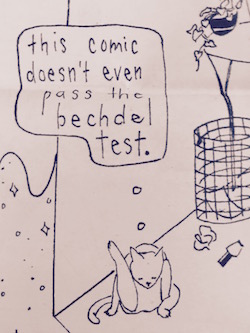
Other standout comics in the issue include an ode to skirts by Whitney Stephens, a great and gory comic strip offering a cathartic Donald Trump moment by Katie Wheeler, a great gag about a seemingly indefatigable customer service rep by Ben Horak, and a fantastic action strip by Marc Palm that has to be a contender for the (nonexistent) 2017 Award for Best Final Panel in a One-Page Strip.
A couple of pages in Thick as Thieves are uneven, but that's to be expected in an anthology. But the good far outranks the bad, and the increase in quality between the first test-run issue and this first official issue indicates that Thick as Thieves could eventually outstrip Intruder if editors Simon Lazarus Vasta and Ryan Tiszai continue on this learning curve.
Warren Ellis's later comics work hasn't done it for me. Even the stuff that most people dig, like Trees and Injection, have just felt like late-stage Ellis to me, which is to say it feels kind of like self-parody: people behave like bastards; they say outrageous things in a condescending tone; some giant threat vaguely makes itself known; finally, everything collapses into a highly unsatisfying ending. Nothing of Ellis's since Planetary has really worked.
To be honest, I'm not sure why I gave the first issue of The Wild Storm the time of day. It's a reboot of Jim Lee's awful Wildstorm superhero universe, which has never really interested me. But the only good Wildstorm comics were Ellis's — particularly his Authority and Planetary, which are the source code for pretty much every superhero comic published in the last decade and a half. The thought of Ellis returning to these comics to restart them with a clean slate seemed like a mammoth mistake. I guess I wanted to gawk at a car crash.
The car crash didn't happen. The Wild Storm is easily Ellis's best mainstream work in a while. It's dialogue-heavy, and a few of the characters aren't immediately unlikeable, which is a refreshing change of pace. You won't find any of Jim Lee's ludicrous costume designs here, and the characters are barely recognizeable; only their awkward insistence on being called by their superhero names — Zealot, Voodoo, etc. — ties them back to the old Image Comics days.
I don't know if The Wild Storm will hold up. It's scheduled to run for 24 issues over two years, and Ellis has proven that he's pretty bad at marathons, to say nothing of his inability to end a damn project in a satisfying way. But it's a promising start, at least.
We're always happy to see Seattle writers doing great things and spreading the Northwest gospel elsewhere, but, boy, this stings a little bit:
News: in Autumn 2017, I'll be starting a position as Assistant Professor of English (Creative Writing) at the Ohio State University!
— Elissa Washuta (@misswashuta) February 15, 2017
Congratulations, Elissa Washuta! We hope you'll sit with us for an Exit Interview to talk about what you'll miss (and what you won't miss) about Seattle. (And if you don't know Washuta's work, you can find her author page — including everything we've ever written about her — right here.)
Your Week in Readings: The best literary events from February 15th - February 21st
Wednesday February 15th: WordsWest
The ongoing West Seattle reading series features two very good Seattle-area poets: Ann Teplick and Sierra Nelson. Teplick’s knockout poem “MOON, in ten parts,” is readily available on the internet. Nelson has written a choose-your-own-adventure poetry book and her eagerly awaited next collection, The Lachrymose Report. C&P Coffee Co., 5612 California Ave. SW, http://wordswestliterary.weebly.com. Free. All ages. 7 p.m.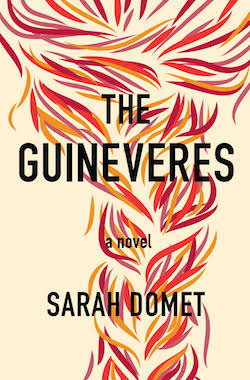
Thursday February 16th: This Is How It Always Is and The Guineveres Reading
Seattle author Laurie Frankel’s This Is How It Always Is is an excellent novel about the family of a young trans girl. Georgia novelist Sarah Domel’s The Guineveres is about four rootless young women named Guinevere who wind up at a convent and have to care for four comatose men. University Book Store, 4326 University Way N.E., 634-3400, http://www2.bookstore.washington.edu/. Free. All ages. 7 p.m.Friday February 17th: Hugo Literary Series: Exile
See our Event of the Week column for more details. Fred Wildlife Refuge, 128 Belmont Ave. E., 322-7030. http://www.hugohouse.org. $10-25. All ages. 7:30 p.m.Saturday February 18th: Seattle’s Fremont and the Centerless Universe
Seattle memoirist Elissa Washuta was selected as the very first Fremont Bridge Writer-in-Residence, meaning last summer she kept a writing office in one of Seattle’s most beautiful bridges. This afternoon, she’ll give a presentation on her experience and be interviewed by Seattle author Anca Szilagyi. Seattle Public Library, 1000 4th Ave., 386-4636, http://spl.org. Free. All ages. 2 p.m.
Sunday February 19th: Nothing to See Here: The Slippery Slope Away from A Free Press
Hugo House event coordinator and novelist Peter Mountford will talk with Sri Lankan journalist Frederica Jansz and Seattle University professor Sonora Jha about “exercising free speech during times of political and social upheaval.” Hm. I wonder if that subject has any practical applications for our current moment in history? Auburn Library, 1102 Auburn Way S., https://kcls.bibliocommons.com/. Free. All ages. 2 p.m.Monday February 20th: Universal Harvester Reading
Mountain Goats lead singer John Darnielle’s debut novel, Wolf in White Van, was an incredibly affecting story of a wounded soul trying to come to terms with society. Darnielle’s second novel is about a video store clerk in 1990s Iowa who discovers a bizarre secret hidden on the films in his store. Town Hall Seattle, 1119 8th Ave., 652-4255, http://townhallseattle.org. $5. All ages. 7:30 p.m.Tuesday February 21st: Chain Letter
Poet Jeremy Springsteed, one of the organizers of the late, lamented Breadline reading series, debuts a new concept. Chain Letter features performances from local writers and musicians who will then become the curator of the next event in the series. Tonight’s readers: Springsteed, Evalynne McLaughlin, and Amber Nelson. Tonight’s music: Tarsier Eyes. Come get in on the ground floor. Vermillion Art Gallery and Bar, 1508 11th Ave., 709-9797, http://vermillionseattle.com. Free. All ages. 7 p.m.Literary Event of the Week: Hugo Literary Series: Exile
Hugo House management plans the themes for their Literary Series events months in advance. They have to give the participating three writers and one musical act plenty of time to come up with new work incorporating their prompts. So it’s not like the theme of this Friday’s Literary Series event, “Exile,” was chosen as a response to the chaos unleashed by President Trump’s Muslim ban. It’s just — well, “a happy accident” isn’t the right term, obviously. More like, the dread that was floating around in the back of everyone’s minds as Republican presidential candidate Donald Trump coaxed throbbing waves of xenophobia from his base happened to be more relevant to 2017 than many of us ever expected.
So this Friday at Hugo House’s Literary Series event at Fred Wildlife Refuge, three writers and one band will present new work centering around the word “Exile.” A certain bigoted red-trucker-cap-wearing specter will undoubtedly loom over the proceedings all night. Will the artists directly engage with those affected by Trump’s Muslim ban? It’s very likely; the internet is heavy with footage of families broken across international lines for no real reason besides a narcissist’s capricious misunderstanding of what causes terrorism. Citizens are openly and seriously talking about wanting to leave America. Exile is in the air.
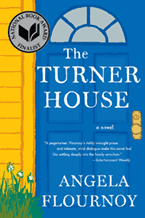
Hugo House selected some very fine writers for this outing of the Literary Series. Angela Flournoy, whose debut novel The Turner House won accolades for its depiction of an African-American family in Great Recession-era Detroit, is headlining. Flournoy will be returning to Seattle later this spring as part of the Seattle Public Library’s Seattle Reads… celebration, so this event serves as a kind of trial run, a way to familiarize yourself with the author before she appears in libraries all over town.
Joining Flournoy will be Portland author Megan Kruse, whose debut novel Call Me Home was a Northwest gothic about the members of an unhappy family that breaks up but can’t quite stop orbiting each other. And poet Phillip B. Williams writes beautifully about the rage and heartbreak of American cities — his “Of Darker Ceremonies” features a chalk outline around a body that “unpeels from the street” and goes on a drug-fueled rampage, “smashes every windshield” it encounters.
These three writers already focus on exiles. Flournoy wrote a whole book about the economic exiles of Detroit, the first people who were abandoned by the American Dream that seems to be slowly edging us all out. Kruse writes beautifully about emotional exile. And Williams has written about the exile of race, the uncomfortable Schrödinger's cat situation that African-Americans find themselves in: if they speak out about injustice, they’re making everything about race, but if they say nothing they’re excluded from the conversation because of their race. Together with electronic industrial pop duo Crater, these three writers will deliver strangely timely pieces that took months to write. Now is the time to speak up for exiles.
NPR published the news this afternoon and literary Twitter demonstrated an excitement and an exuberance that I haven't seen since the days before the election:
The hugely successful fantasy trilogy His Dark Materials will be getting a "companion" trilogy, author Philip Pullman announced this evening.
The first book of the new series, which will collectively be called The Book of Dust, is set for publication on October 19.
Gone rogue
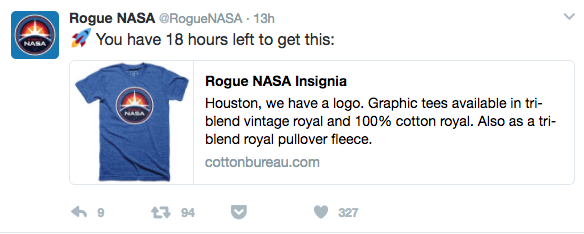
After Donald Trump’s inauguration, a number of self-described “rogue” accounts started popping up on Twitter: @RoguePOTUSStaff, @RogueNASA, @AltNatParkSer. They all supposedly were accounts run by government employees who are outraged by the Trump administration. This quickly became a fad, as demonstrated by a Twitter list of dozens of such accounts.
In this age when Republicans immediately label any news that they dislike as “fake news,” and when Democrats complain loudly about the conservative social media bubble, I find it infuriating that liberals are religiously retweeting anything these so-called “Rogue” accounts post.
Let me say this. All, or most, of these accounts are fake. They’re phony. They’re liberal wish fulfillment. They’re telling you what you want to hear. There’s evidence that they’re fake. It’s fiction, like a social-media West Wing repackaged for the resistance, confirming your biases and giving you the (phony) gossipy thrill of insider knowledge.
And, further, let me say this: even if every last one of those dozens of Twitter accounts were real, they would serve absolutely no purpose. An anonymous Twitter account is not going to take down President Trump. No information shared on those accounts is going to have a real effect on the real world.
These rogue Twitter accounts are what happen when we as a society allow actual journalism to atrophy. They deliver the same thrills as a Woodward-and-Bernstein takedown without any of the actual content. They’re taking the place of investigative reporting in our circles, but without any real-world consequences. It’s entertainment disguised as journalism.
If you want to hear actual reports from inside the White House and other federal agencies, you should support journalism. Real journalism makes a difference. These Twitter accounts would never drive a Trump administration official to quit. You know what can drive a Trump administration official to quit? The quality sourced investigative journalism you’ll find at the Washington Motherfucking Post.
I blocked these rogue government accounts as soon as they started proliferating on Twitter, and it was the best social-media decision I’ve made in 2017. They’re a distraction from reality — bad fiction to make you feel good. If we want to change the world, we have to support truth and transparency, and that means prioritizing good journalism over ineffectual fan fiction.
FOLKS: "Many Rivers to Cross"
Somewhere the sky
touches the earth — and
the name of that place is
the end — in between
is the journey.
— African SayingHistory Lesson: Diaspora
They love Africans in museum cases,
so they left African cultures intact.
— Ezekiel Mphahlele
"Remarks on Negritude"First they stacked us
in the holds of their dark shipsThen they feasted on our mothers
our names our blood our shadowsThey routed and captured our masks
our thrones our bronze carved doorsNow in museums we discover our masks
their ancient eyes track usWe shiver
Discrete signs announce our origins
other signs caution us Do not touchDo not touch Alarms will sound
Something shakes our memory
we encounter our shadowsSomething crosses and recrosses
the danger waterWe recall Praise Songs
Our ancestors touch usOur names come home
for Pam McClusky (Seattle Art Museum)
Horn Men
hey
you ever wonder
how they survive
these quote unquote black
men jazz jiving they tenor
saxes
in the up-to-date badlands
of South Africa
Johannesburg to be
precisesome
say they be bad
they be up from the bush
long time out of the
bush these brothers be
watch they
pull music from spots
of leopards
from deep river beds
some say they music be
ancestor masks carved
from water treesthese bad brothers
what they know
be awesome
our essence
uh huhwhat they make
be true as rain
see how they sweeten
this parched earth
welcome these brothers
hear them
move us into freedomand beyond
Song
1.
fresh off the
boat
they break you
in barbadosthey split for you
you tounge
they slice for you
you earthey dig for you
a hole of dirt
for you big child
bellythey whip you
make you belly
lie downthey put on you
you neck
the ring of
ironthey say no
to no eat the
sugar canethey put on you
you mouth
the mask of
tinthey tie you
man to
four green tree
they make you
man fly to
all four windthey say you
you sing2.
sing calypso sky
sing soka wind
they ship you
to they homeall ways
they break you
in barbados3.
salt
all ways
salt4.
our bones be
ocean floorsour bones be
masts of shipsour bones be
coral reefsour bones sing
of saltAlien Dance Hall
Here a glittered stocking shimmers
here a severed pair of eyes
jams the bluesEverywhere
desire flaps its tentlike armsLegs slow drag in the pockmarked dust
embrace suns blackened by ancient storms
clawed birds scream
perform a rag a cakewalk a stomp
a tangoObserve
this needle wind delivers
imported fragrances of old blood
and fetal bonesStay here if you wish
Settle here if you wishRemember while you can
somebody called
my ancestors cannibalsDance with me
Dance with me
To celebrate the paperback release of his excellent novel Lovecraft Country, Seattle author Matt Ruff is doing an AMA (that stands for "Ask Me Anything") on Reddit right now. (And if you're looking for inspiration for things to ask him, here's my interview with Ruff from his book launch party last year.)
A musical journey in the 90s
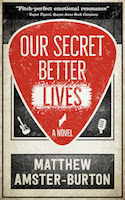
We're so excited to have Matthew Amster-Burton as our sponsor this week. His new novel Our Secret Better Lives is a funny, stirring, and exciting tale. Set in 1994, it's about Katy, a huge music fan on a big adventure to a new state and college, who finds herself doing one thing she never imagined: stepping in front of a microphone in a new band.
We've got a full chapter, and more information, on our sponsor's page so you can see just how deftly Matthew handles these engaging characters. No surprise — this may be his first novel, but it's his fifth book. Mark the date: March 19th at 11 am. That's when Matthew will be at Ada's Technical Books to talk about the work. But why wait? Ada's has the book for sale on their website right now. Pick up a copy! Support local authors and local indie bookstores all in one fell swoop.
Sponsors like Matthew Amster-Burton make the Seattle Review of Books possible. Did you know you could sponsor us, as well? Get your stories, or novel, or event in front of our passionate audience. Take a glance at our sponsorship information page for dates and details.
Book News Roundup: Seattle comic book store goes nonprofit
- Wallingford comics shop Comics Dungeon is becoming a nonprofit. From the press release:
Seattle comic book store, Comics Dungeon, Inc., has made the change to leave behind its for-profit status to become a fully non-profit corporation.
Comics Dungeon, Inc will be changing its name to Comics for Community, Compassion and Culture, C4C3. “After being part of the community for over 25 years, we wanted our focus to be giving back to the very community that built our success,” said Scott Tomlin, C4C3’s president. The Comics Dungeon retail store name will remain the same.
What kind of asshole lights a Little Free Library on fire?
Here's an opportunity to win free tickets to the Hugo House's Literary Series event this Friday, which features authors Megan Kruse, Angela Flournoy, and Phillip B. Williams, with musical guests Crater.
Win tix to see Angela Flournoy @hugohouse @fredwildlife 2/17-to enter post pic of yourself reading in Seattle with #seattlereads by 2/15 pic.twitter.com/cJvMpjwAKN
— Seattle Library (@SPLBuzz) February 12, 2017
Third Place Press, the publishing arm of Third Place Books, has compiled the final speeches of President and First Lady Obama into book form. Titled Be Vigilant But Not Afraid: The Farewell Speeches of Barack Obama and Michelle Obama, the book costs $7 and proceeds will benefit three very good causes. Find more information on their site.
The Miami Herald paints a (depressing) picture of the (depressing) library of the future:
Virtual reality simulations, talking robots and a magic school bus — this is what happens when a theme park company designs a library.
Landmark Entertainment Group — the company responsible for the Spider-Man and Jurassic Park rides at Universal Orlando and Caesar’s Palace in Las Vegas — has partnered with the city of Homestead to create the world’s first “Cybrary,” or cyber library.
“We are redefining what the library is,” said George Gretsas, Homestead’s city manager. “When you think about bettering this thing called a library, which has been around since before 300 B.C, do you turn to the library scientists — the librarians — to create a fresh and new thing, or do you turn to people who have expertise in the areas of entertainment and attraction?”
Fantastic Washington DC bookstore Kramerbooks is currently in a state of disarray, with senior management resigning, supposedly in response to the store's new owner.
A London bookshop is tweeting the first Harry Potter book at Piers Morgan.
When will they officially change the name to Department of Edumacation?
Hey @usedgov you misspelled "Du Bois" as "DeBois", got busted & apologized, then you misspelled "apologies" as "apologizes" in your apology pic.twitter.com/J610rUE8D9
— Judah Friedlander (@JudahWorldChamp) February 12, 2017
Paul Auster on making noise in the age of Trump
Last Thursday, I interviewed Paul Auster at Town Hall Seattle. Interviewing Paul Auster is intimidating as hell; he's one of the most widely translated American novelists of all time, he's produced a magnificent array of influential novels since the mid-1980s, and he's a world-class thinker on the topic of stories and storytelling. We discussed topics ranging from his stellar new novel 4321 to the secret of writing convincing sex scenes to a harrowing high school basketball game. The event was recorded by KUOW and will appear on Town Hall's site in its entirety, but for now we thought we'd share this timely exchange with our readers.
What you think a writer's role is in the age of Trump?
Far be it from me to tell anybody what to do. I mean, artists are artists. And I think making art, even in the age of Trump, is firmly — he doesn't own everything, you know? He taken over a lot, but he doesn't own it all. And there's value in novels, there's value in music, there's value in painting. Think of a world without novels, or string quartets, or ballets, or plays, or movies. It's unimaginable, really.
My theory is this: that the novel, just by its very nature, is an act that enforces democracy. Because the novel always is about an individual or a set of individuals. And by entering the inner lives of often the most ordinary kinds of people, we're giving them the full dignity of their humanity. I think reading novels is a way to participate in the inner lives of others. People who are not us. And that in itself is a political act.
Ok. Still. Artists are citizens as well. And then it's up to everybody to decide what he or she wants to do outside of the realm of the books that they write. I, myself, have spoken out at times. But I would never urge anyone else to do that unless that person really wanted to.
Now, I've thought long and hard about this new world that we've entered three weeks ago and I feel my life has to change. I can't go on in the way I've been going. But this is my own private thing. So there's an organization I've been involved in for years called PEN — I'm sure most of you know what PEN is. It's really the only human rights organization defending writers around the world.
And at various times I've been vice president of American PEN, secretary, and on the board. And I've been asked to be president a couple of times — to run — but I haven't wanted to because it's a very time-consuming job, and I wanted to do my work. Well, now the position will open up again in about a year — early 2018. And I'm going to throw my hat in the ring, and if they want me, I'll do it and I'll use it as a platform for speaking out. Because it is a great organization, especially the Freedom to Write program, which is defending writers. PEN just got an Egyptian writer out of prison, just a month ago. So I think we can be effective.
As the former head of that program, Larry Siems, said to me once, "our job is to make noise, as much noise as possible. And sometimes people hear us." Beautiful way to think, yeah?
The Sunday Post for February 12, 2017
Doris Lessing’s library: a life in 4,000 books
To an incurable book snoop, this seems like the opportunity of a lifetime: Nick Holdstock was given free access to Doris Lessing’s books in order to inventory them after her death. It’s a massive project (Lessing’s collection, Holdstock says, “seemed untouched by what Walter Benjamin called ‘the mild boredom of order’”), to which he brings a storyteller’s eye, tracking Lessing’s studies, her eccentricities, and her ongoing conversation with the books she loved.
Best of all, Lessing had drawn faces next to several passages. They wore hats and had particular expressions. The eyes in the face drawn next to the tautological statement “It is not hidden knowledge but useless knowledge unless you have the capacity to use it”, were looking sideways at the text, perhaps doubtfully. No such equivocation was on the face drawn next to the sentence “You start by mastering the ability to learn”. It was smiling, its hat jauntily perched.
Fifty Shades Darker: It’s The Economy, Stupid
La Donna Pietra follows Fifty Shades Darker through six degrees of separation back to Jane Eyre and then examines the economic underpinnings of both. Smart and smartass and much more fun than you’d think.
Granted, Jane Eyre is rather short on explicit sex scenes. Likewise, Fifty Shades Darker is rather short on believable character development. That said, Jane Eyre also features characters telepathically calling to each other across great distances and ridiculous melodramatic plot contrivances about madwomen locked in attics, so it’s not like realism is much of a metric here.
The Surprising Rise of the “S---gibbon”
There’s something irresistible about really good, creative swearing, maybe because the average joe (that’s me, not you) pulls from a small pool of threadbare curse words. Last week, Pennsylvania senator Daylin Leach delighted the Twitterverse by challenging Donald Trump in terms both blunt and unexpected.
Ben Zimmer tracks the origins of the headline-making epithet. Purely etymological interest, of course.
As Leach’s “fascist, loofa-faced, shit-gibbon” line made the rounds on social media, he didn’t back down from the characterization (which was inspired by reports that Trump had threatened to “destroy the career” of a Texas state senator over the civil asset forfeiture issue). His spokesman Steve Hoenstine doubled down ...
The Troll Taunter
Emily Temple-Wood joined the Wikipedia community as a 12-year-old and spent a decade on the receiving end of gender-based threats and harassment. Her solution? Relentlessly post profiles of her harassers’ greatest fear: strong, smart, successful women.
Jake Orlowitz, the head of The Wikipedia Library, was at the annual Wikimedia conference in Mexico City in July 2015 when he witnessed Temple-Wood’s anger and frustration boil over. “Out of nowhere, Emily turns red and chucks her cell phone against the wall,” recalls Orlowitz. “She was not in the mood for another death threat, and that’s what had come to her inbox. But at this point, it’s very clear that somehow, Emily is fueled by every challenge.”
Fuck That Gator
This is fascinating: an unavoidably clickbait-y piece about a family’s attempt to reclaim their personal tragedy from social media. Tommie Woodward was killed by an alligator while swimming in a bayou in eastern Texas; posthumously, he became the butt of viral online mockery. It’s easy to see how irresistible the story of Tommie’s death would be — you’d have most readers at “gator” — but also: what a breakwater the Internet can be for simple human empathy. Thomas Golianopoulos does a good job balancing both threads.
Some outlets used an image from Tommie’s Facebook page of him chugging a Miller High Life while wearing a T-shirt that reads “Classy Motherfucker”; a news anchor for KFDM, the CBS affiliate in nearby Beaumont, breathlessly noted “the hundreds and thousands of pageviews and hundreds of comments” that the story generated on its website. Another circulated photo portrayed Tommie as the epitome of dudedom: grungy reddish-blonde chin strap beard, middle finger up, wearing a goofy cowboy hat, wraparound Guy Fieri shades, and a “This Guy Needs a Beer” shirt. On Facebook, strangers littered Tommie’s wall with comments like “lol rip dumbass” and “What. A. Dumb. Fuck.” A controversial hunt for the killer gator ensued, which only compounded the attention.
Tommie’s friends and family refuse to allow his final actions define the 28 years that preceded it. He loved Van Halen, Marilyn Monroe, and Ken Griffey Jr. He was good with his hands. He enjoyed assembling computers, building sandcastles with his nephew, fishing, swimming, camping, and grilling. He had an adoring big sister, a mom, a best friend, and an identical twin brother, Brian, all left to wrestle not just with grief over a freak tragedy, but also the aftermath of public humiliation.
Seattle Writing Prompts: the Macy's sky bridge
Seattle Writing Prompts are intended to spark ideas for your writing, based on locations and stories of Seattle. Write something inspired by a prompt? Send it to us! We're looking to publish writing sparked by prompts.
Standing on the northeast corner of Third and Stewart, looking south on Third, one sees a sky bridge. It connects a parking garage to the building that once housed The Bon Marché, one of three powerhouse retailers that bounded out of the wellspring of Seattle in the olden days. The other two being, of course, Frederick & Nelson, and the still-standing, and now heavily politicized in the age of Trump, Nordstrom (which stands, ironically, in Frederick & Nelson's old building).
The Bon — now a Macy's that is downsizing its store by selling floors of office space where once there were mattresses, kitchen goods, fine crystal, and other standard department store fair — stood connected to its parking garage by this one appendage. I can't tell you how many times I've crossed it, on the sixth floor.
We don't have many sky bridges in Seattle (if you're from the Midwest, you may know them as skyways), there's one a few blocks east connecting Nordstrom to Pacific Place Mall; there's a long windowless one that walks across the roof of the King County Administration Building — that diamond faced wonder caught between the jail and the King Country Superior Court — for walking prisoners from their cells to their hearings; there are two in the Market, and up the street, one from the end of Lenora to Alaskan Way; there's the massive bridge that connects the two parts of the Convention Center where it's bisected by Pike, an expanse turned into display area during conventions, where goods are hawked above the bustling streets of the city, much like bridges in olden Europe used to contain apartments and stores.
It turns out we don't have many sky bridges because the city makes property owners pay for them. Macy's, in fact, paid a fee of $31k back in 2010 for this very skybridge, up from the original $300 when it opened in 1960. Or, about the average monthly rent for a two-bedroom apartment in Seattle.
Seattle politicians aren't very circumspect with their views on the rank inequality of sky bridges:
“What a sky bridge does is it takes people off of the right of way and puts them up in the air, and leaves usually the people who aren’t good enough to go in the buildings down below,” City Council member Jean Godden said. “It’s really not very friendly.”
Surely, given all this, we can find our way around some writing prompts that take place stories above the street?
Today's prompts
- The ticket booth on the west side of the bridge had a little window, but when she was working, tucked back in there, she couldn't see down the length of the bridge. But, they gave her a little screen attached to a camera so she could see who was coming. Except, that evening, the camera went dark just seconds before she heard the gunshot.
- It was really strange. Never before had Snowy done anything but execute his duties as a seeing eye dog with aplomb. Yet, this morning he wouldn't budge at all. Half way across that damn sky bridge, he sat down and turned into a statue of a dog, resolute and still. What could have made him do that, all of a sudden?
- He was terrified of heights. Every step across the bridge always came with a prayer that the big one wouldn't strike while he was on the bridge. Turns out, maybe he was worried for a very good reason....
- Maybe it was unromantic. Her friends certainly tried to talk her out of it, but if there was one thing that brought the two of them together, it was their love of sky bridges. And since she'd be the one proposing, she was gonna do it as she damn well pleased.
- It was kind of amazing, the sort of thing you'd never expect, the sort of transformation that only happens once in a person's life. But there she was crossing back to her car, and what had happened in the past hour inside the department store had changed her so much, that she barely recognized the woman in her memory who had crossed the other way not even an hour ago.
Book News Roundup: Get a publishing job, help Standing Rock, and ruin your Mr. Darcy sex dreams
Sherman Alexie is sharing a bill with Death Cab for Cutie's Ben Gibbard and Naomi Wachira on Sunday, March 5th at the Showbox on 1st Avenue. This is a fundraiser benefitting Standing Rock and The Water Protector Legal Collective. Sherman Alexie is the only writer in the Northwest who can consistently share a stage with rock stars. This is worth your time, and it benefits a great cause. Buy your tickets now.
Here's a book job that doesn't require you to move to New York City: Seattle-based press Sasquatch Books is hiring a Production Editor! Here (PDF) is the job listing. Applications are due by February 20th. But you probably shouldn't turn in your application on the last day, since editors are deadline-driven. So work on your resume this weekend and get it in on Monday.
Mark Campos at the Seattle Weekly this week contributed a comic strip that pokes fun at that guy who asks those kinds of questions at readings. You know the guy. Yeah, him.
Don't click this link if you frequently fantasize about Mr. Darcy. Seriously, don't click it.
Tell AWP that they need to provide better disability accessibility
We at the Seattle Review of Books aren't attending the Association of Writers & Writing Programs (AWP) conference in Washington DC, but we've been following along on social media as the Seattle contingent of attendees represents us in readings and at conferences. They're doing us proud!
Unfortunately, AWP management doesn't seem to be rising to the occasion. We've seen several Facebook posts complaining about a failure to provide accessibility for the disabled, particularly with power doors onsite at the Washington [DC] Convention Center that don't open at the push of a button. (Here are the ADA's conference planning guidelines and here's an ADA compliance guide for nonprofits.) One writer complained to AWP management that the accessibility desk was not accessible; they say they were told to bring their complaint to the accessibility desk.
I've learned from personal experience that AWP responds best to public pressure. So if you're at AWP — or if you're a literary-minded person who expects a major conference to treat all its guests with fairness and inclusivity — I urge you to read the wonderful Facebook post below and contact AWP management to let them know that this behavior is unacceptable.
UPDATE: Wow. AWP's response to one Twitter complaint is wholly unacceptable:
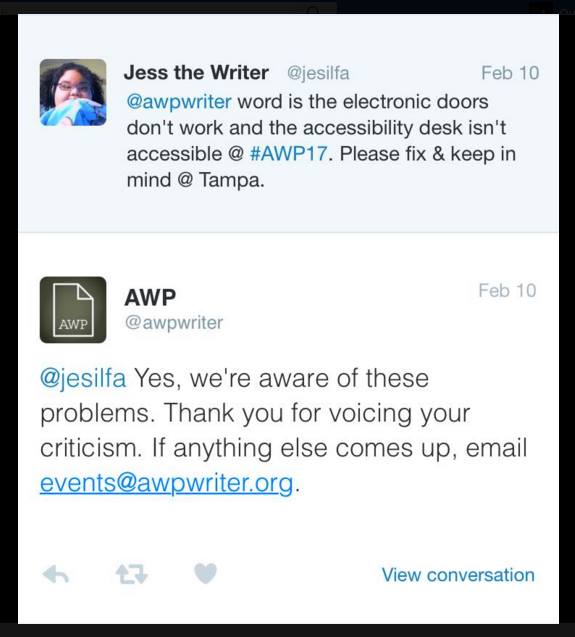
The Help Desk: Your one-stop shop for advice on plagiarism, pince-nez, and spider blood
Every Friday, Cienna Madrid offers solutions to life’s most vexing literary problems. Do you need a book recommendation to send your worst cousin on her birthday? Is it okay to read erotica on public transit? Cienna can help. Send your questions to advice@seattlereviewofbooks.com.
Dear Cienna,
The other day at the eye doctor’s office, I found myself considering a pince nez. Would this make me look like a total ass, or is it time for FDR’s preferred eyewear to make a comeback?
Stu, Bellevue
Dear Stu,
There are two instances in which I could see this look working on a contemporary face: if you were to pair your prince nez with a reptile contact lens, so that you had one large, freaky snake eye, or if you were to poke your non-prince nez eye out with a fork. All other alternatives are unacceptable.
Kisses,
Cienna
P.S. Speaking of lenses and history and such, go read Short Nights of the Shadow Catcher.
Dear Cienna,
Settle a bet: is there ever a time when plagiarism is morally justified?
Evie, Port Townsend
Dear Evie,
Considering that I have used stories of my alcoholic father's suicide to score free drinks in bars, take my views on morality with as much salt as you wish: No, plagiarism is never morally justified.
Kisses,
Cienna
P.S. Speaking of immorality, go read Insane Clown President.
Dear Cienna,
I just want to know more about the spiders, please. The way you talk about them makes my stomach feel funny, and I’m not sure yet if it’s good or bad.
Shelob, Pioneer Square
Dear Shelob,
Did you know that female black widows can store sperm in their abdomens for up to two years? Or that spider blood is blue? Or that their silk is five times stronger than steel – in fact, it's so strong and elastic that scientists cannot replicate it?
Or that the two things you never, ever want to do on a Friday night with your spider friends is draw a bubble bath or play "light as a feather, stiff as a board" because both will end in horror?
Kisses!
Cienna
P.S. Go read The Private Life of Spiders.
Portrait Gallery: Chimamanda Ngozi Adichie
Each week, Christine Marie Larsen creates a new portrait of an author for us. Have any favorites you’d love to see immortalized? Let us know
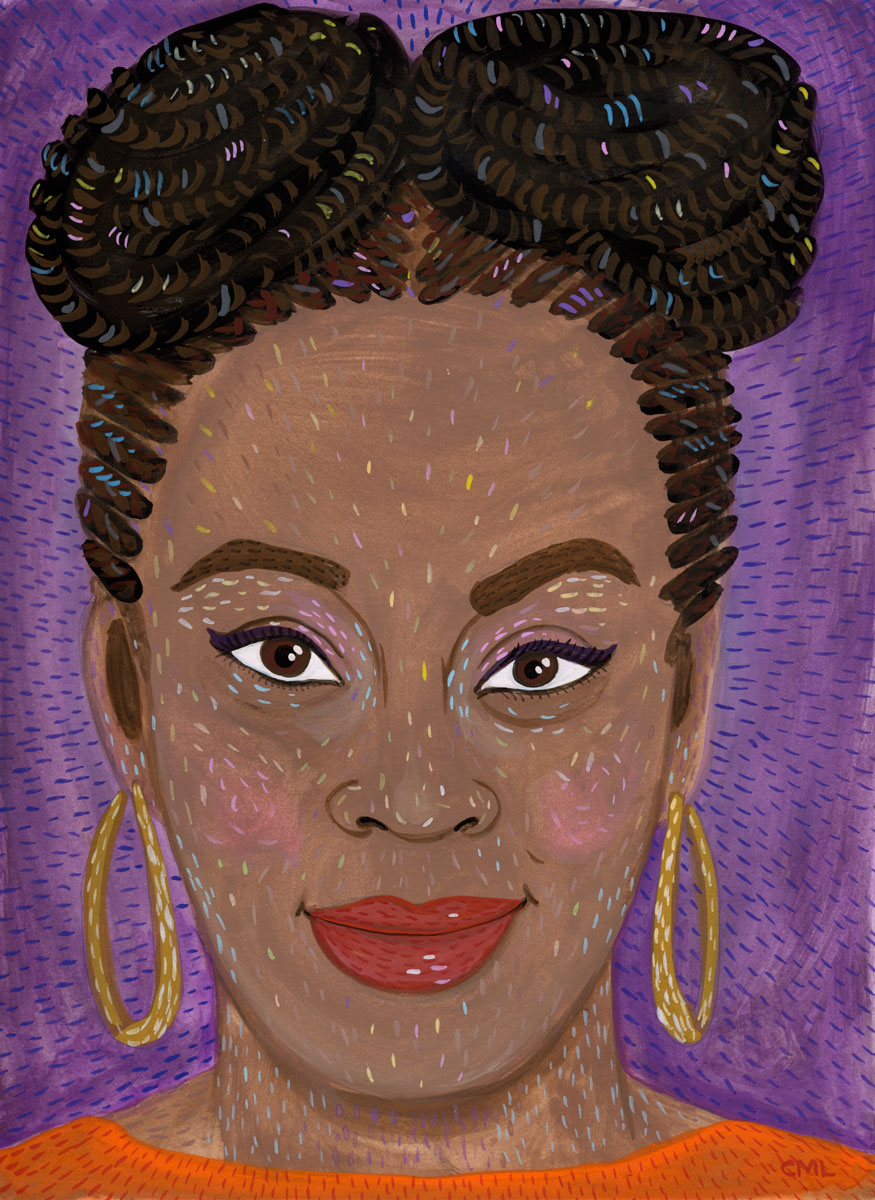
Friday February 10th
Bushwick Book Club: Americanah
Chimamanda Ngozi Adichie’s Americanah is one of the greatest novels to be published in the last five years. Actually, probably the last decade. Maybe the last 25 years? Seems likely. Tonight, Seattle musicians present new work based on the most recent Greatest American Novel. If they rise to the material, this will be a night to remember.
Elliott Bay Book Company, 1521 10th Ave, 624-6600, elliottbaybook.com . $10. All ages. 7 p.m.


